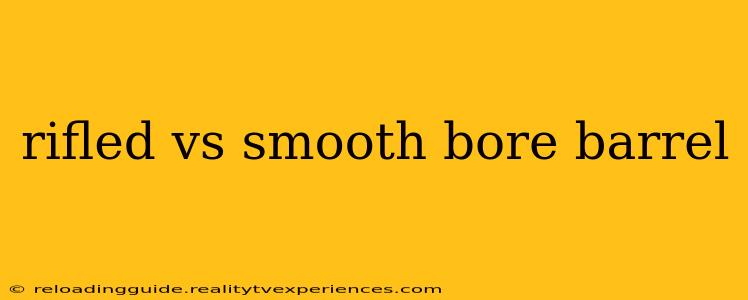Choosing the right firearm often hinges on understanding the fundamental differences between its core components. One such crucial element is the barrel—specifically, whether it's rifled or smoothbore. This seemingly small detail drastically impacts accuracy, range, and the overall functionality of the weapon. This article delves into the intricacies of rifled and smoothbore barrels, exploring their historical significance, mechanical differences, and practical applications.
Rifled Barrels: Precision and Range
A rifled barrel features spiral grooves, known as rifling, cut into the inner surface. These grooves impart spin to the projectile as it travels down the barrel. This spin, called gyroscopic stabilization, dramatically increases accuracy and range. The spinning bullet resists tumbling, maintaining a stable trajectory over longer distances.
Advantages of Rifled Barrels:
- Increased Accuracy: The spin imparted by the rifling significantly enhances projectile stability, leading to tighter groupings and greater accuracy at extended ranges. This is crucial for target shooting, hunting, and military applications.
- Extended Range: The stable trajectory resulting from spin allows the bullet to travel further before gravity and air resistance significantly affect its path.
- Higher Velocity: While not always the case, some rifled barrels can achieve slightly higher muzzle velocities compared to smoothbore counterparts of similar length, although this depends heavily on the ammunition and barrel design.
- Versatile Ammunition: Rifled barrels can accommodate a wide variety of bullet designs, each optimized for different purposes, from hunting to self-defense.
Disadvantages of Rifled Barrels:
- Higher Manufacturing Cost: The intricate process of rifling the barrel adds to the overall production cost.
- Potential for Fouling: The grooves in the rifling can accumulate fouling (residue from the propellant and bullet), requiring more frequent cleaning.
- Not Ideal for All Applications: While versatile, rifled barrels aren't always the best choice for every scenario. For example, shotguns designed for close-quarters combat may benefit more from a smoothbore design.
Smoothbore Barrels: History and Versatility
Smoothbore barrels, lacking the spiral grooves of their rifled counterparts, have a completely smooth inner surface. Historically, smoothbore firearms were prevalent, primarily using round shot or buckshot. While less accurate at long range than rifled barrels, smoothbores offer their own unique advantages.
Advantages of Smoothbore Barrels:
- Simpler Manufacturing: The absence of rifling simplifies the manufacturing process, leading to lower production costs.
- Versatile Ammunition: Though traditionally used with shot, smoothbore barrels can also fire slugs, offering a degree of adaptability.
- Ideal for Shot: The smoothbore design is ideally suited for firing shot, making it the preferred choice for shotguns used in hunting, sport shooting (clays), and home defense.
- Less Cleaning Requirement (Generally): Due to the absence of grooves, smoothbores generally require less frequent cleaning compared to rifled barrels, although cleaning remains essential for safe and reliable operation.
Disadvantages of Smoothbore Barrels:
- Lower Accuracy: The lack of spin results in lower accuracy, particularly at longer ranges. Projectiles are more susceptible to tumbling and unpredictable flight paths.
- Limited Range: The unstable trajectory of projectiles fired from a smoothbore significantly limits their effective range.
- Less Kinetic Energy (Generally): Compared to equivalent rifled rounds, smoothbore projectiles often have less kinetic energy.
Conclusion: Choosing the Right Barrel
The choice between a rifled and smoothbore barrel depends entirely on the intended application. Rifled barrels excel in situations requiring accuracy and long-range precision, making them suitable for target shooting, hunting, and military applications. Conversely, smoothbore barrels are ideal for applications where versatility and simplicity are prioritized, such as shotgun usage for hunting or home defense. Understanding these fundamental differences allows for informed decision-making when selecting a firearm.

